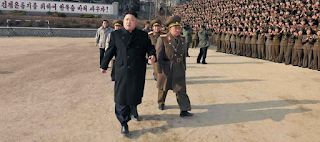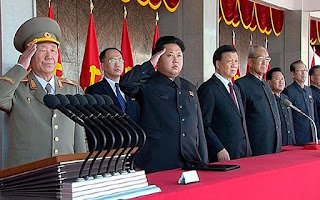Is the North Korean Preparing to Conduct another Nuclear Test?
By E. Stanley Ukeni
A news
report that just came out today suggests that, US government officials have
assessed that there are compelling intelligence indicators pointing to a possible
underground nuclear test by the North Korean government. If this intelligence assessment
turns out to be correct, it would be the hermit country’s sixth underground
nuclear test.
This
assessment is based; in part on the fact that recent satellite imagery showing
that there has been significant topographical changes in the grounds of the
North Korean Punggye-ri nuclear test site, in recent weeks. US officials noted
that, for several weeks, United States’ surveillance satellites have carefully monitored
activities on at the test site—including vehicles, personal and equipment
movements, as well as construction work on tunnels.
It was
noted that the most recent imagery shows that activities have ceased at the
site— an indicator that a test could be eminent. In the past, just before the
previous nuclear tests, the same patterns had been observed, causing US
officials to conclude that a nuclear test was in the offering, in the near term.
In confirmation
of the US assessment, the spokesperson for the South Korean Ministry of
Unification said, in a Friday press briefing, that “It is assessed that North
Korea is ready to carry out a nuclear test anytime if its leadership decides to
do so.”
It
however makes good sense to assume that since the North Korean leadership must
be aware that US spy assets in the sky are constantly monitoring their activities,
they would occasionally engage in the deceptive acts of moving its military personnel,
weapon systems and equipment around in other to thwart US surveillance satellites’
ability to definitively know what the country’s military is up to.
If the
North Korean leader, Kim Jong Un, does give the order for an underground
nuclear test to be conducted it would be a marked provocation for the
administration of the US President, Donald Trump. Officials of the new Trump administration
have all but admitted that the North Korean conundrum is one that is extremely challenging
to manage.
The US
Secretary of State Rex Tillerson, tacitly alluded to this fact in Tokyo, on his
recent trip to Asia earlier this month, when he remarked. “…I think it’s
important to recognize that the diplomatic and other efforts of the past twenty
years to bring North Korea to a point of denuclearization have failed…”
Although
the new US administration has been carefully reviewing its options on how to
deal with the North Korean dilemma, they are equally mindful that a
miscalculation in the handling of this possible provocation by the North
Koreans could result in an outcome with an unintended consequence.
It is
noteworthy to add that it has been reported that United States’ military strategists
have assessed that a US attack on North Korea would likely result in a North
Korean military assault on Seoul—an outcome that would undoubtedly lead to catastrophic
military conflict that all sides would be wise to avoid.
In the
event, however, that the North Korean leadership does sign off on an order to
conduct a nuclear test—in violation of past United Nations’ Security Council
resolutions, the United States is maintaining a specially equipped WC-135
aircraft in the region, with the capacity to conduct air sampling test in other
to confirm a suspected underground nuclear test.
It
should be recalled that after the January, 2016 Pyongyang’s nuclear test, the
United Nations’ 15-member Security Council, at the urging of the United States
and Japan, held an emergency closed-door meeting to discuss possible punitive
sanctions against North Korea. After the meeting, the members U.N. Security
Council (which includes China, Russia and the United States) together condemned
the test as “a clear violation of past Security Council resolutions…and of the nuclear
non-proliferation regime”.
The
statement from the Security Council, at the time, stated in part, that, “…The
members of the Security Council (express) determination to take further
significant measures in the event of another DPRK nuclear test. And in line
with this commitment and the gravity of this violation, the members of the
Security Council will begin to work immediately on such measures in a new
Security Council resolution.”
It’d be
interesting to see how the members of the United Nations would react to a new
North Korean violation of U.N. Security Council’s nuclear non-proliferation
resolution in the current global political climate. I do sincerely hope that
cooler heads prevail, in the unfortunate event that North Korean leadership
does decide to proceed with the underground nuclear test.
Authored
by E. Stanley Ukeni, © 2017. All Rights Reserved. This material and other articles or
stories posted on this blog site may not be reproduced, published, broadcast,
rewritten or redistributed, in whole or in part, without prior expressed
written permission from the author, E. Stanley Ukeni.
You
are invited to follow E. Stanley Ukeni on twitter at; @EzStan . I invite you to
equally follow me on google+







Comments
Post a Comment